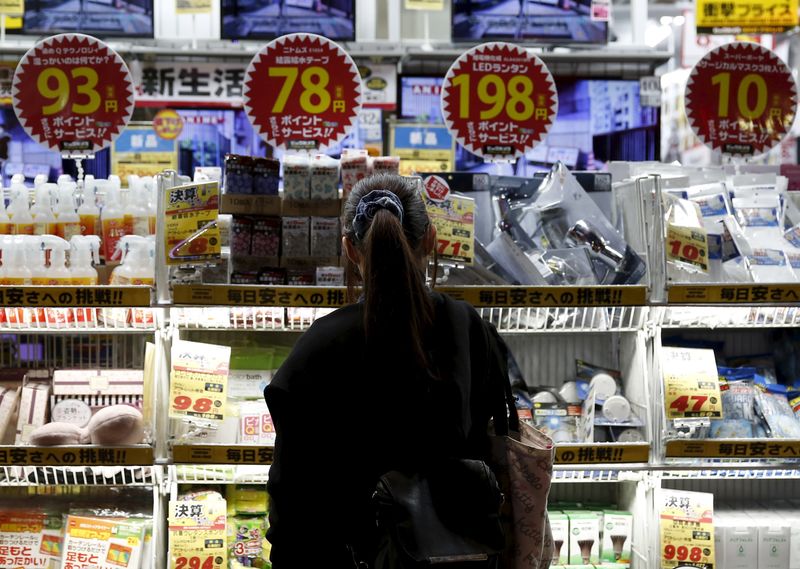By Leika Kihara
TOKYO (Reuters) - Japan's consumer inflation was flat in the year to February as low energy costs and weak consumption put a lid on price growth, government data showed on Friday, keeping the central bank under pressure to top up stimulus although it eased policy less than two months ago.
A separate BOJ index calculated by the central bank to strip out the effects of energy and fresh food prices showed consumer inflation at 1.1 percent in the year to February, unchanged from January.
The data reinforces a dominant market view that the Bank of Japan will be forced to cut its inflation forecasts and push back the timing for hitting its 2 percent price target at a quarterly review of its projections next month.
"Japan won't see inflation hit the BOJ's target in the next few years," said Koya Miyamae, senior economist at SMBC Nikko Securities.
"The BOJ is falling into a vicious cycle in which it remains under pressure for further easing even as it has few effective policy means available," he said.
The government's core consumer price growth calculation for Tokyo, considered a leading indicator of nationwide prices, marked the biggest annual drop in nearly three years in March, suggesting that inflation will remain subdued on weak demand as the world's third-largest economy skirts recession.
Tokyo's core CPI fell 0.3 percent in the year to March, the first time it dropped by as much since April 2013 and bigger than a median market forecast for a 0.2 percent decrease.
The nationwide core consumer price index (CPI), which includes oil products but excludes volatile fresh food prices, was unchanged in February from a year earlier, government data showed on Friday.
That compared with a median market forecast of a 0.1 percent increase and followed flat growth marked in January.
CHEAPER BEEF RICE BOWLS
Continued declines in fuel costs were mostly behind the subdued inflation with a 10.9 percent drop in energy costs offsetting moderate price rises for items such as processed food, hotel rooms and television sets.
But some analysts say weak household spending is prompting some companies to hold back on raising prices, or even cut them, to lure consumers who have seen wages barely rise.
Last year, a budding economic recovery had allowed restaurant chains to raise the prices of their "gyudon" beef rice bowls - once a symbol of Japanese deflation because intense competition kept their prices so low.
But they are once again starting to offer discounts, including restaurant chain Sukiya, which extended a campaign offering the rice bowls 1.6 percent cheaper than usual.
If such competitive measures spread, it could threaten the BOJ's efforts to nudge households into spending more readily because they expect prices will soon rise.
The BOJ stunned markets in January by adopting negative interest rates to prevent slowing overseas growth and volatile financial markets from derailing a fragile economic recovery.
But the move has failed to boost stock prices and corporate sentiment has soured since then as exports have taken a hit from soft emerging market demand.
When the BOJ deployed its massive asset-buying programme in April 2013, it pledged to achieve 2 percent in roughly two years. With inflation stalled three years into the commitment, the central bank has repeatedly pushed back the timeframe for hitting its target - including at its January meeting.

It now expects inflation to hit 2 percent around the first half of fiscal 2017, six months later than the timing it projected last October.